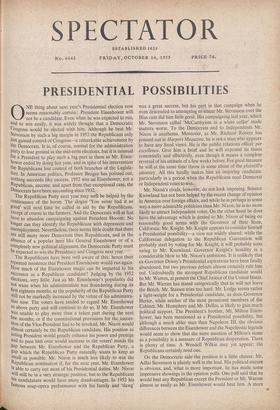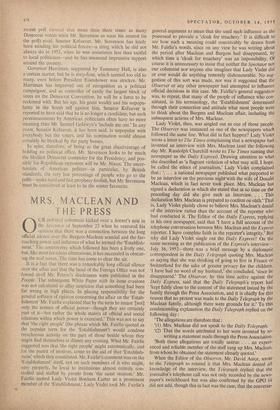PRESIDENTIAL POSSIBILITIES
ONE thing about next year's Presidential election now seems reasonably certain : President Eisenhower will -not be a candidate. Even when he was expected to run, and to win easily, it was widely thought that a Democratic Congress would be elected with him. Although he beat Mr. Stevenson by such .a big margin in 1952 the Republicans only just gained control of Congress—a remarkable achievement by the Democrats. It is, of course, normal for the administration Party to lose ground in the mid-term elections, but it'is unusual for a President to play such a big part in them as Mr. Eisen- hower ended by doing last year, and in spite of his intervention the Republicans lost control of both branches of the Legisla- ture. In American politics, Professor Brogan has pointed out, nothing succeeds like success. 1952 was an Eisenhower, not a Republican, success; and apart from that exceptional case, the Democrats have,been succeeding since 1932. The Republican Party next year may well be helped by the continuance of the boom. The slogan 'You never, had it so good' will next time be called in aid by the Republicans, except of course to the farmers. And the Democrats will at last have to abandon campaigning against President Hoover. No longer can they identify the Republicans with depression and unemployment. Nevertheless, there seems little doubt that there are still many more Democrats than Republicans, and in the absence of a popular hero like General Eisenhower or of a Completely new political alignment, the Democratic Party must be expected to win the Presidency and Congress next year. The Republicans have been well aware of this; hence their repeated insistence that President Eisenhower would run again. How much of the Eisenhower magic can be imparted to his successor as a Republican candidate? Judging by the 1952 elections, very little. Just as Mr. Eisenhower's popularity did not wane when his administration was floundering during its first eighteen months, so the popularity of the Republican Party will not be markedly increased by the virtue of his administra- tion now. The voters have tended to regard Mr. Eisenhower as above party and will continue to do so. If Mr. Eisenhower Was unable to play more than a token part during the next few months, or if the constitutional provisions for the succes- sion of the Vice-President had to be invoked, Mr. Nixon would almost certainly be the Republican candidate. His position as acting President would greatly enhance his power and prestige and to pass him over would increase in the voters' minds the gap between Mr. Eisenhower and the Republican Party, a gap which the Republican Party naturally wants to keep as !small as possible. Mr. Nixon is much less likely to win the Republican nomination if, for the next year, Mr. Eisenhower is able to carry out most of his Presidential duties. Mr. Nixon will still be in a very strategic position, but to the Republicans his candidature would have many disadvantages. In 1952 his famous soap-opera performance with his family and `dawg' was a great success, but his part in that campaign when he even descended to attempting to smear Mr. Stevenson over, the Hiss case did him little good. His campaigning last year, which Mr. Stevenson called `McCarthyism in a white collar' made matters worse. To the Democrats and to Independents Mr. Nixon is anathema. Moreover, as Mr. Richard Rovere has pointed out in Harpers Magazine, he is not a man who appears to have any fixed views. He is the public relations officer par excellence. Give him a brief and he will expound its thesis contentedly and effectively, even though it means a complete reversal of his attitude of a few weeks before. For good measure he will at the same time throw in some abuse of the plaintiff's attorney. All this hardly makes him an inspiring candidate, particularly in a period when the Republicans need Democrat or Independent votes to win.
Mr. Nixon's rivals, however, do not look imposing. Senator Knowland has not been helped by the recent change of opinion in America over foreign affairs, and while he is perhaps in some way a more admirable politician than Mr. Nixon, he is no more likely to attract Independent votes. On the Other hand he does have the advantage which is denied to Mr. Nixon of being on reasonably good terms with the Governor of their State, California: Mr. Knight. Mr. Knight appears to consider himself a Presidential possibility—a view not widely shared; while the Californian delegation to the Republican Convention will probably start by voting for Mr. Knight, it will probably soon swing to Mr. Knowland. Governor Knight's hostility is a considerable blow to Mr. Nixon's ambitions. It is unlikely that ex-Governor Dewey's Presidential aspirations have been finally abandoned, but two previous defeats almost certainly rule him out. Undoubtedly the strongest Republican candidate would be Mr. Warren, at present the Chief Justice of the United States. But Mr. Warren has stated categorically that he will not leave the Bench. Mr. Stassen tries too hard. Mr. Lodge seems rather a light-weight for a Presidential candidate, as does Governor Herter, while neither of the most prominent members of the Cabinet, Mr. Humphrey and Mr. Dulles, is likely to gain much political support. The President's brother, Mr. Milton Eisen- hower, has been mentioned as a Presidential possibility, but although a much abler man than Napoleon III, the obvious differences between the Eisenhower and the Napoleonic legends would seem to show that the mere mention of Milton's name as a possibility is a measure of. Republican desperation. There is plenty of time. A Wendell Wilkie may yet appear; the Republicans certainly need one.
On the Democratic side the position is a little clearer. Mr. Adlai Stevenson is plainly well in the lead. His political stature is obvious, and, what is more important, he has made some impressive showings in the opinion polls. One poll said that he would beat any Republican except the President or Mr. Warren almost as easily as Mr. Eisenhower would beat him. A more recent poll showed that more than three times as many Democrat voters want Mr. Stevenson as want his nearest (in the poll) rival, Senator Kefauver. Mr. Stevenson has lately been minding his political fences—a thing which he did not always do in 1952, when he was sometimes less than tactful to local politicians—and he has mustered impressive support around the country.
Governor Harriman, supported by Tammany Hall, is also a certain starter, but he is sixty-four, which seemed too old to many, even before President Eisenhower was stricken. Mr. Harriman has improved out of recognition as a political campaigner, and as controller of easily the largest block of votes on the Democrat Convention, he will be a force to be reckoned with. But his age, his great wealth and his unpopu- larity in the South tell againSt him. Senator Kefauver is reported to have said that he is no longer a candidate, but such pronouncements by American politicians often have no more meaning than Mr. Samuel Goldwyn's 'include me out.' In any event, Senate r Kefauver, it has been said, is unpopular with everybody but the voters, and his nomination would almost certainly he blocked by the party bosses.
In spite, therefore, of being at the great disadvantage, of holding no political office, Mr. Stevenson looks to be much the likeliest Democrat contender for the Presidency, and pos- sibly his Republican opponent will be Mr. Nixon. The uncer- tainties of American politieg—in particular, by British standards, the very low percentage of people who go to the polls—make hard and fast prophecy foolish, but Mr. Stevenson must be considered at least to be the winter favourite.











































 Previous page
Previous page